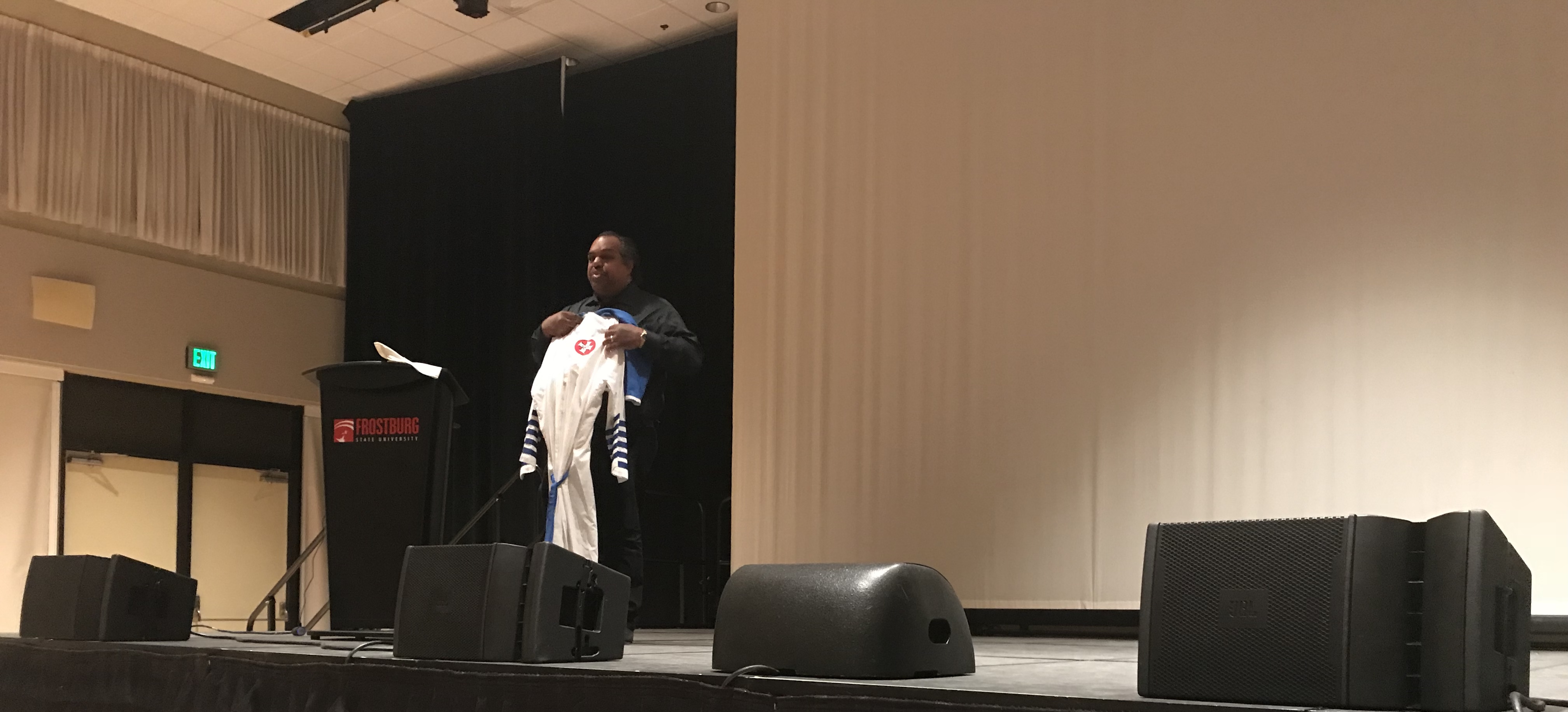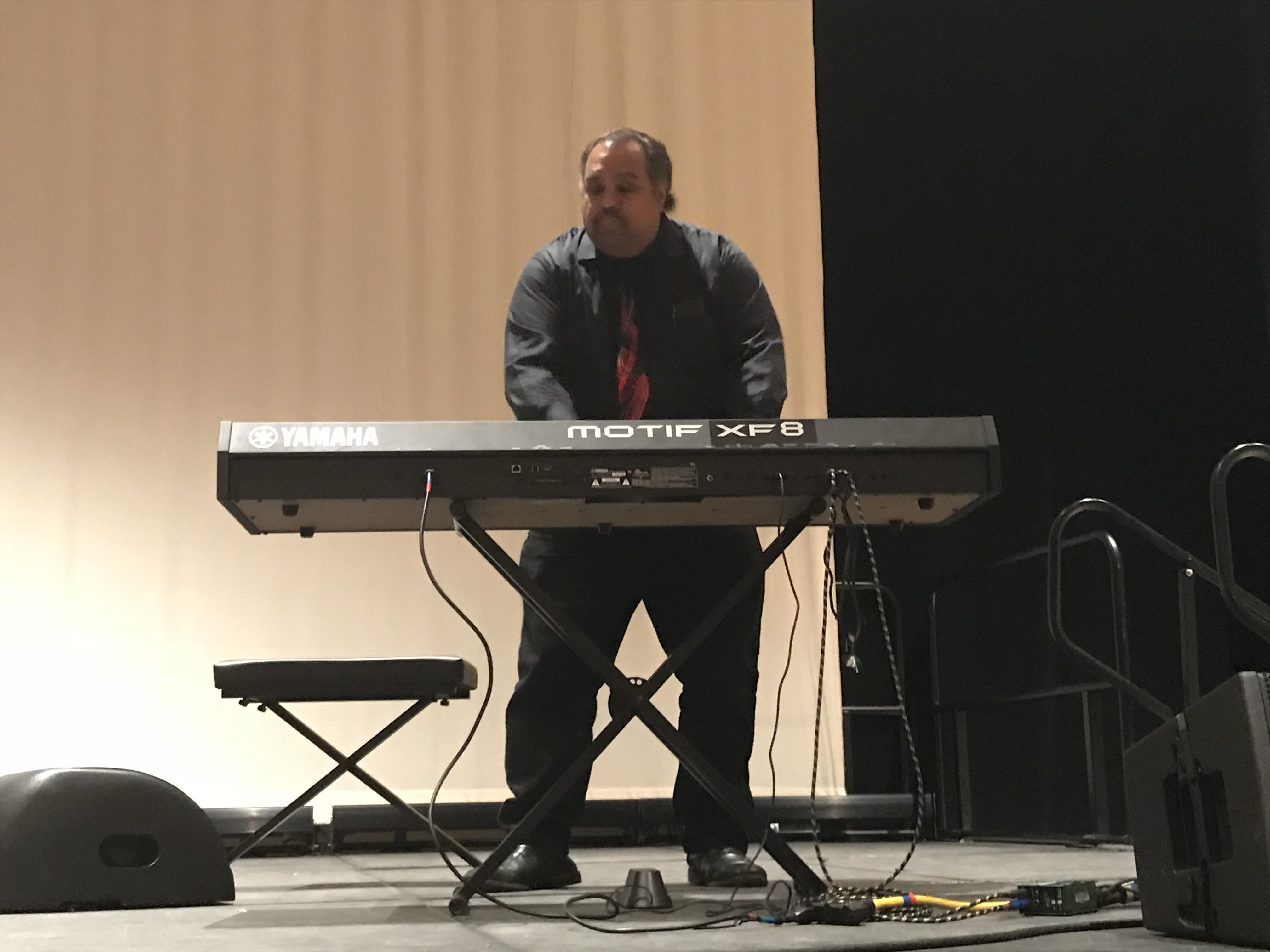Daryl Davis – The Pursuit of an Answer
Students, faculty, and community members gathered on Monday, Feb. 26 in the Alice R. Manicur Assembly Hall at the Lane University Center to listen to a presentation given by American musician and author, Daryl Davis.
Davis’ book, Klan-destine Relationships, was published in 1998. An updated version will be released later this year. His documentary, Accidental Courtesy: Daryl Davis, Race & America, was aired on PBS in February of 2017.
The lecture was presented by the Martha T. and Ralph M. Race Western History Lecture Series and co-sponsored by the African American Studies Program, an FSU Foundation Opportunity Grant, the Center for Student Diversity, Equity and Inclusion, the Office of Student Affairs, and the departments of History, Philosophy, Communication, Sociology, English and Foreign Languages, and Psychology.
In his first time speaking at Frostburg, Davis opened by thanking the audience for their attendance. Davis earned a Bachelor of Music degree from Howard University in 1980 and then began touring the country as a musician. He joked with the audience that even though it was his first time presenting at Frostburg State, he had been here before to see a girl he used to date.
Davis turns 60 next month but began his lecture from his childhood days. He called himself a “U.S. Embassy brat” and grew up abroad. He travelled as a young boy and continues to travel today as a famous musician. He credits himself to have been to six continents and 56 countries, saying he has seen a “multitude of cultures, ethnicities, traditions; you name it, he’s seen it”. He referenced his education growing up as a “UN of embassy kids” as his schools contained students from around the world.
Coming home to the states was a harsh reality as a black student in the 1960s, as Davis either attended an all-black school or a black and white school. He mentioned that overseas he was “living 12 years before his time.”
Davis began his account of his first encounter with racism in 1968 in Belmont, Mass. He was one of two black students in the school. His friends had asked him to join the local Cub Scouts, and in the parade that year Davis was asked to carry the flag. During the parade, as he led with the flag, Davis kept getting hit by rocks, water bottles and various other objects by both young kids and adults. Realizing what was happening, Davis’s troop leaders sheltered him and scurried him toward the end.
At the age of 10, this was the first time he had experienced racism, let alone even heard of the phenomena. There had been no racism overseas. He had been an only child, so there were no older siblings to learn from. Davis credited his parents by saying, “they got it right the first time,” which drew laughter from the audience.
When recounting to his parents what had happened, he could not wrap his head around the idea of racism. At 10 years old, he could not understand why someone inflicted pain on another individual because of the color of their skin. He could not believe it, and therefore, he did not.
On April 4, 1968, racism became a reality to Davis. On that day, Martin Luther King Jr. was assassinated, and major cities in the United States were burned to the ground with violence and riots – all because of race. He still did not know why people had such a problem.
This day led him to a question that would shape the rest of his life: How can you hate me when you don’t even know me?.”

Davis has chased an answer for 50 years.
As a teenager, he purchased as many books as he could get his hands on that focused on the ideologies of those who believed in superiority. The books did not give him the answer for which he was looking.
The 1980 romantic drama film Urban Cowboy sparked a resurgence of country music. As the only black man in the band, Davis performed at the Silver Dollar Lounge in Fredrick, Md. in the mid-1980s. The lounge was not segregated but was usually all-white.
One night following a standard Friday night performance, Davis was approached by a white gentleman who had said Davis played like Jerry Lewis – an American rock and roll singer who played a boogie woogie style on the piano.
After talking with the man for a little, Davis had learned that the man, at 40 years old, had never sat down with a black guy. Baffled by this, Davis asked why, and the reason then became very clear. The gentleman replied and informed Davis that he was a member of the Ku Klux Klan. Davis laughed because he could not believe the man was serious. The gentleman then showed Davis his membership card, which quickly subdued his laughter.
Before leaving, they exchanged numbers, and the gentleman told Davis he wanted him to call him when he returned to the Silver Dollar Lounge.
The Silver Dollar Lounge was a stop on the tour cycle Davis’s group was on, so they were back within a few weeks. The next time he performed at the lounge, the gentleman brought Klansmen and women along with him. Some were interested in the performance and some were not, according to Davis. Suddenly, it dawned on him that these people could be the answer to the question he has been pursuing for years. The gentleman Davis had gotten to know gave him the contact information of the Klan Leader, Roger Kelly.
Today, there is not such thing as a single, united KKK. There are many separate, autonomous Ku Klux Klan organizations. There are many rival KKK clans.
Kelly was the Grand Dragon of Maryland. “Grand” meaning he was a state leader and “Dragon” granting him the position of governor. The gentleman warned Davis to not reveal where he got his information and told him to never go to his house because he would kill him.
Davis had his white secretary, Mary, call Kelly to set up an interview. He did not want Kelly to hear his voice and turn down the interview by inferring that Davis was black. He wanted the interview to be spontaneous and candid. Davis’s book, Klan-destine Relationships, was his first and the first book written about the KKK by a black man.
The interview was to be held at the Motel above the Silver Dollar Lounge. Davis bought some soda cans from the vending machine, so he would be able to offer a drink to his guests. He wanted to be cordial. Davis also remembered that the KKK was a Christian organization. He made sure to have a Bible on hand for the interview to be able to guide Kelly to show him where the Bible preaches racial separation.
Right on time, the Grand Nighthawk, Kelly’s bodyguard, escorted him into the room. The Grand Nighthawk wore military style clothing and carried a gun while Kelly followed behind in a blue suit and tie.
Kelly shook hands with Davis and then asked to see his ID. Davis handed him his driver’s license and Kelly then asked him about his address. Startled, Davis told Kelly he also knew where he had lived, but was careful to not reveal the gentleman’s name who had informed him. Kelly only brought up Davis’s address because a fellow Klan member lived on the same street – Davis had no idea. Today, that Klan member is serving a prison sentence in Maine after being arrested and convicted of a hate crime.
While the two were talking, Kelly informed Davis that he believed blacks were inferior because they have smaller brains, they live on welfare, sell drugs, and are simply just not well-respected. Davis was there to learn from Kelly, not judge him on his views.
Suddenly, Kelly made a noise and both men lounged in towards each other. Davis said their eyes were speaking loud and clear, almost shouting. Davis’s eyes asking Kelly what he just did and Kelly asking Davis the same. The noise had sounded again. That is when both men realized it was neither of them making the noise. The ice had melted that Davis had kept the soda cans in and the cans had fell to the bottom causing the noise. Both laughed at their ignorance.
It was a teaching moment, Davis said. Ignorance breeds fear all because some foreign entity of which we were ignorant entered our comfort zone. Fear can then breed hatred if not kept in check, and then in turn, hatred can breed destruction.
Davis then moves to the example of Aug. 12, 2017 in Charlottesville, Va. The riot had culminated into destruction because a white supremacist mowed down people with his car killing one and injuring 20 others. Davis knows the head of the Klan in the area as well as the organizer. The riot was not over a statue; the riot was first steps of a race war. Charlottesville was a primary target because Virginia was the head of the confederacy, and the area was said to have a weak police department. Davis warns that we as a society need to stop addressing the symptoms and cure the source, which is the ignorance.
The meeting concluded with Kelly giving Davis a Klan card. Davis does not like what Kelly stands for but realized they have more in common than they do in contrast, that contrast being race.
Davis would invite Kelly to his house but had to meet him at the Park N Ride. The invitation was never returned. After a couple of years, Kelly had stopped bringing the Grand Nighthawk with him. It was then that Kelly was promoted to the position of Imperial Wizard, a national leader of the KKK, and was in charge of 13 states. Davis was then invited to KKK rallies and then Kelly’s house.
After hearing of a black man attending KKK rallies, CNN had gotten in contact with Davis and asked to follow him at a rally. CNN then came with Davis to a rally and afterwards interviewed Kelly in the basement of Davis’s house. The story was unheard of: an interview with the head of the Ku Klux Klan in a black man’s house. The footage ran every house for 24 hours.

In the interview, Kelly said, “I got more respect for this black man than I do for you white n*****s out there.” Respect, Davis believed, is a major foundation in bridging the gap of ignorance. When an individual gives their opponent a platform, there is an excellent chance of reciprocation.
Davis then continued to distinguish the difference between ignorance and stupidity. Ignorance, Davis said, is making the wrong decision or bad choice without having the facts. Stupid is having the facts but still making the wrong decision. According to Davis, ignorance is not synonymous with stupidity. The cure for ignorance is education, while stupidity is incurable.
The cemented beliefs in Kelly’s mind of white superiority began to crack the more and more he talked with Davis and thought of his words. Overtime, the cement crumbled, and Kelly quit the Klan. This led to the Klan falling apart. He headed the largest Klan group in Maryland. Kelly gave Davis his hood and robe, which Davis showed to those in attendance. Davis said that he has around 44 or 45 hood and robes, and well over 200 people have left the Klan.
Davis explained that we as a society tend to talk about, at, or past people rather than talking with them, which makes a difference. Even though Davis did not respect Kelly’s beliefs, he “respected his right to say it and at the end, what I said made more sense than what he said.”
Davis then told the audience that society can become one of two things: what we let it become or what we make it. He continued to say that we call ourselves the greatest nation on Earth, and we invented the technology to send a man to the moon. He then asked, “how can we talk to someone on the moon, but we have trouble talking to someone of a different race, ethnicity, religion, or persuasion?.”
The ideology needs to catch up to the technology, Davis said, “We are living in a space age with stone age minds.”
He continued and said that we need to work together to change discriminatory practices.
Davis then discussed one of his influences, Chuck Barry. The pair had been friends for 32 years and Davis credits Barry with being a mentor, hero, and a friend prior to his passing.
Making his way over to the piano on stage, Davis treated the audience to the thing he does best. Without looking down at the keys, Davis gave the audience a bit of the “boogie woogie.”
Following applause, Davis reminded the audience that society can become one of two things, and we need to make it something rather than letting it become something.
He concluded by saying that he still is pursuing an answer to the question he asked 50 years ago.
Davis plans to open a museum, and an updated version of his book will be released later this year. For more information, visit daryldavis.com or email Davis at daryl@daryldavis.com




